Step-by-step instructions for planting dill on greens in July
Emerald green fresh dill – one of the most popular seasonings. The essential oil in which herbs and dill seeds are rich gives it a unique spicy aroma. It perfectly complements salads, soups, and main courses. In addition, dill is indispensable when preparing pickles for the winter.
Among other varieties of herbs, dill stands out for its unpretentiousness. It grows well in various types of soil and does not require special care. Fragrant bushes can be grown all summer. Today we will tell you in detail about planting dill on greens in July.
Is it possible to sow dill in July and August?
Sowing dill in the middle of summer is not the most common thing. After all, it is usually planted once, in the spring. Meanwhile, dill can be sown from early spring until the very end of summer to provide the family with healthy greens for the entire season.
Landing dates
When to plant dill in the summer? In central Russia, its seeds are sown until the first half of August. Later, dill is planted in open ground only in the southern regions, where summer does not end so quickly.
Advice. When calculating planting dates, be guided by the climatic conditions of the region and the speed of ripening of the variety. The greens must have time to grow before the onset of cold weather.
Choosing the right variety
Successful dill cultivation begins with choosing the right seeds. Russian breeders have developed many successful varieties of the crop, producing a lot of lush, fragrant greenery.
Among these varieties, Kutuzovsky, Anker, Almaz, Sevastopolsky, Ozornik, Umbrella, Grenadier, Preobrazhensky, and Iney stand out. They have proven themselves to be fast-growing and not prone to flowering.
When choosing dill for sowing in midsummer, it is important to consider that not all varieties will ripen at the same time. According to the timing of ripening, dill is divided into early, mid-season and late-ripening.
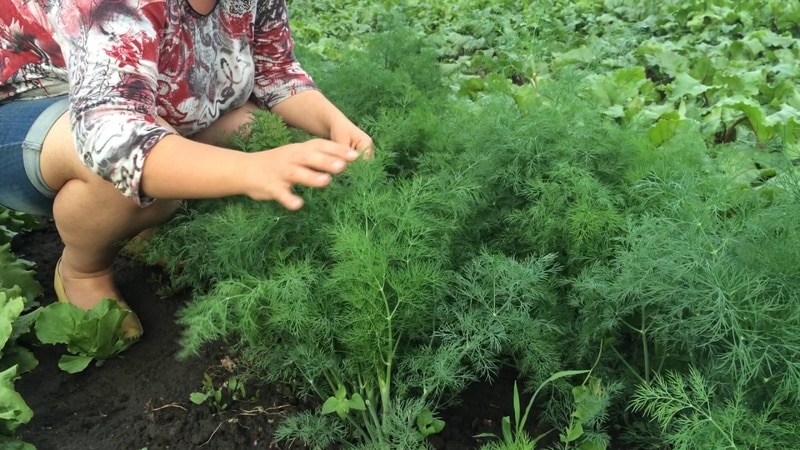
Early
Early ripening varieties produce the first young greens within a month and a half after the sprouts appear. But the bushes of early greenery are not as lush as those of mid-season and late varieties. It begins to bloom after the formation of 5-6 leaves. This drawback should be taken into account when choosing a variety.
It is important to know! Early ripening dill forms umbrellas immediately after the stem grows. No more than six branches of greenery grow on a bush.
Thus, early varieties are grown to quickly produce a small amount of greenery. Formed seeds and umbels are well suited for making pickles in the fall.
Among the early ripening varieties, there are such as Gribovsky, Redut, Richelieu, Dalniy, Grenadier.
Mid-season
Mid-season varieties form branches of greenery one and a half to two months after seed germination. The bushes grow lush and produce a lot of fragrant grass. Up to ten branches are formed on one plant.
Attention! Mid-season dill is the optimal combination of ripening time and green mass.
Popular mid-season varieties include Lesnogorodsky, Amazon, Abundant-leaved, and Umbrella.
Late
Late (or bush) varieties are notable for their powerful, well-leafed stems. Each bush grows more than ten branches of greenery.
Important! Late dill gives the richest harvest of greens.But it also takes the longest to ripen – up to two and a half months.
It is advisable to sow varieties of this group in mid-summer only in the southern regions of the country, otherwise the greens simply will not have time to grow before the end of the season.
The later line includes such varieties as Alligator, Buyan, Uzory, Salyut, Kibray.
Sowing dill seeds in July
Sowing dill, like any crop, begins with preparing the soil and seed material.
Soil preparation
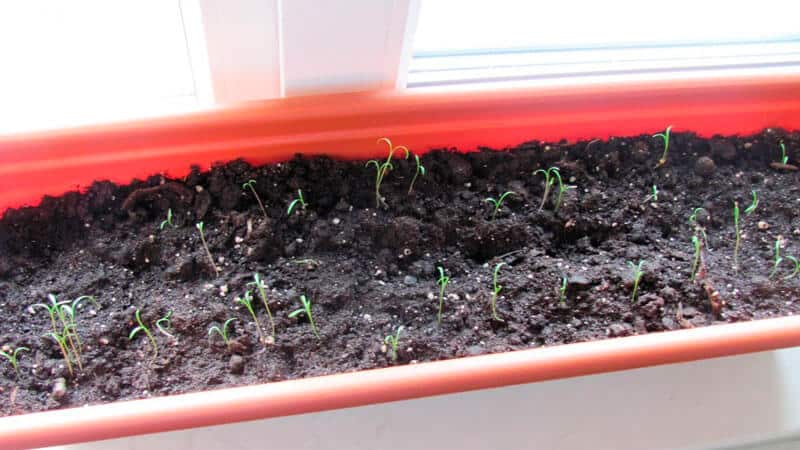
The bed is dug up, humus, compost, and mineral fertilizers are added.
When choosing a place for planting, it is worth considering that dill grows well in neutral soil. Wood ash, dolomite flour, and lime will help reduce soil acidity.
Attention! In acidified soil plants develop poorly and are susceptible to diseases.
Seed preparation
Seeds are prepared for planting shortly before sowing: disinfection will protect crops from diseases, and soaking will improve germination.
Advice. Before planting, soak the dill seeds in clean water for several days. This will weaken the protective layer of essential oil on the surface of the seeds and speed up the emergence of sprouts.
Soaking is carried out in several stages. First, the seeds are placed in a linen bag and washed for 2-3 minutes in hot water, but not in boiling water. Then the bag is placed in water at room temperature for three days.
To remove the released essential oils, the water is changed several times a day. In this case, the bag is washed well with running water. This will prevent souring and spoilage of the seeds.
Landing instructions
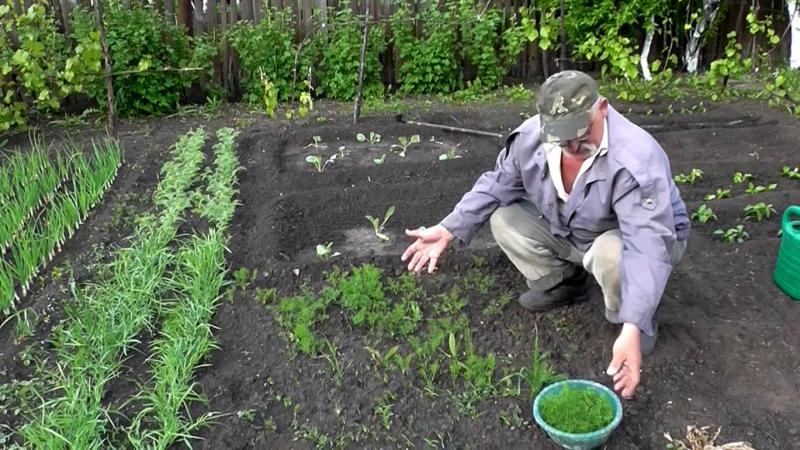
The seeds, pickled and soaked for three days, are removed from the bag and dried. They should be free-flowing and light.
The prepared bed is leveled and watered with a small amount of water.Furrows approximately 2 cm deep are cut on the surface. A distance of 20 cm is maintained between rows.
The change is distributed along the grooves and sprinkled with half a centimeter of peat, sand or humus. The soil surface is compacted. The crops are not watered immediately after planting. Otherwise, the seeds will go deeper into the ground and germination will deteriorate.
Care after landing
Caring for a dill bed includes regular watering and feeding, loosening the soil, removing weeds.
Plants are watered with warm, settled water. Before sprouts appear above the soil surface, make sure that the soil does not dry out.
Important! During the period of stem formation, dill is sensitive to lack of moisture. If there is little water, the plants quickly bloom and the amount of useful greenery decreases.
The next day after watering or rain, the soil is loosened, while weeds are removed.
Dill needs feeding. Fertilizers are applied for the first time when preparing the soil for planting. The soil is also fertilized before sowing the seeds, adding the nutrient mixture directly into the furrows. Superphosphate, Nitrophoska, and complexes are used as fertilizers.
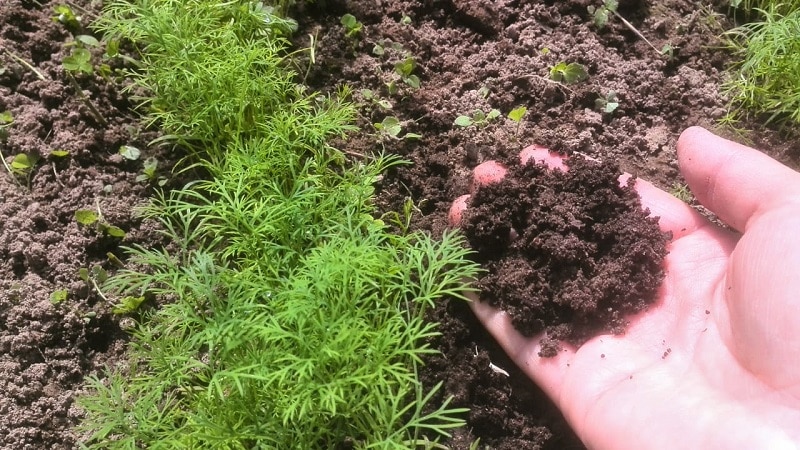
Advice from experienced summer residents
Recommendations from experienced gardeners will help you grow spicy herbs without unnecessary hassle:
- it is convenient to sow greens in neighboring beds with tomatoes or cucumbers - pre-fertilized soil is also perfect for dill seeds;
- For dill, you can use vacated beds from early crops - radishes, lettuce, onions, etc.;
- spices planted along fences and fences when sowed densely displace even perennial weeds;
- timely watering increases the amount of greenery and slows down the formation of umbrellas.
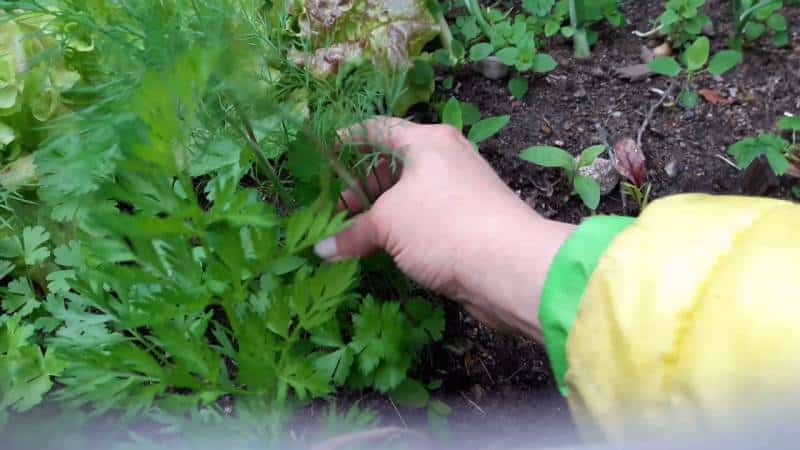
Conclusion
Unpretentious dill is easy to grow for greens all summer.The main thing is to choose the variety wisely, based on the climatic conditions of the region. By planting fragrant greens in mid-summer, you will provide your family with vitamin seasoning for the entire season. And umbrellas and seeds will perfectly complement the taste of winter preparations.